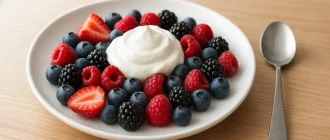Bloating and gas can turn an ordinary day into an uncomfortable struggle. What you eat plays a crucial role in how your digestive system behaves.
High-FODMAP Foods That May Cause Bloating
This chart presents high-FODMAP foods that may contribute to bloating, ranked by their bloating risk score. Higher scores indicate a greater likelihood of causing bloating.
Best Foods to Reduce Bloating and Gas
1. Ginger
Ginger is a natural digestive aid that helps relieve bloating by stimulating digestion and reducing inflammation. It contains gingerol, which supports gut motility.
- Best way to consume: Drink ginger tea, chew on raw ginger, or add it to warm water with lemon.
2. Pineapple
Pineapple contains bromelain, an enzyme that aids in breaking down proteins and easing digestion. This can help reduce bloating and gas.
- Best way to consume: Eat fresh pineapple as a snack or blend it into a smoothie.
3. Cucumber
Cucumbers have a high water content, which can help flush out excess sodium and reduce water retention—key contributors to bloating.
- Best way to consume: Eat raw cucumber slices or add them to water for hydration.
4. Bananas
Rich in potassium, bananas help regulate sodium levels and reduce fluid retention, minimizing bloating.
- Best way to consume: Eat ripe bananas on their own or mix them into yogurt or smoothies.
5. Fennel Seeds
Fennel seeds relax digestive tract muscles and help expel trapped gas, making them an effective natural remedy.
- Best way to consume: Chew fennel seeds after meals or brew them into a tea.
6. Peppermint Tea
Peppermint relaxes the muscles of the digestive system, reducing bloating and discomfort. Studies have shown it can help with IBS symptoms.
- Best way to consume: Drink freshly brewed peppermint tea after meals.
7. Yogurt with Probiotics
Probiotic-rich yogurt introduces beneficial bacteria into your gut, improving digestion and reducing bloating.
- Best way to consume: Choose plain, unsweetened yogurt and mix it with fruit or honey.
Foods That Help Reduce Bloating
This chart represents foods that help reduce bloating, ranked by their bloating-relief score. Higher scores indicate greater effectiveness in reducing bloating.
Worst Foods That Cause Bloating and Gas
1. Carbonated Drinks
Sodas and sparkling water trap gas in the digestive system, leading to uncomfortable bloating.
- Better alternatives: Choose still water or herbal teas.
- Avoid: Drinking carbonated beverages quickly, as this increases swallowed air and bloating.
2. Cruciferous Vegetables (Broccoli, Cabbage, Cauliflower, Brussels Sprouts)
These vegetables contain raffinose, a type of carbohydrate that is difficult to digest and causes gas production.
- Better alternatives: Cooked versions of these vegetables are easier to digest than raw ones.
- Avoid: Eating large portions of raw cruciferous vegetables, especially at night.
3. Beans and Lentils
Beans contain oligosaccharides, complex sugars that the body struggles to digest, leading to excessive gas.
- Better alternatives: Soak beans overnight before cooking to reduce gas-forming compounds.
- Avoid: Eating large portions of beans in one meal.
4. Dairy Products
For those with lactose intolerance, dairy can cause bloating, gas, and digestive distress due to an inability to properly break down lactose.
- Better alternatives: Lactose-free dairy products or plant-based alternatives like almond or oat milk.
- Avoid: Consuming high-lactose dairy like milk and soft cheeses if sensitive.
5. Fried and Fatty Foods
Greasy foods slow digestion, leading to bloating and discomfort as they sit in the stomach longer.
- Better alternatives: Opt for baked, grilled, or steamed foods instead.
- Avoid: Eating deep-fried foods, especially before bedtime.
6. Artificial Sweeteners (Sorbitol, Mannitol, Xylitol)
These sugar alcohols are not fully absorbed by the body, often leading to bloating and gas.
- Better alternatives: Choose natural sweeteners like honey or stevia in moderation.
- Avoid: Consuming sugar-free gum and candies, which often contain these sweeteners.
7. Chewing Gum
Chewing gum increases swallowed air, contributing to bloating and excessive gas.
- Better alternatives: Opt for mints or breath freshening strips instead.
- Avoid: Excessive gum chewing throughout the day.
Foods That Commonly Cause Bloating and Gas
This chart represents foods that commonly cause bloating and gas, ranked by their gas-producing score. Higher scores indicate a greater likelihood of bloating.
Real-Life Cases of Bloating and Gas Management
Case 1: Woman, 34, New York
A woman loved drinking sparkling water throughout the day but noticed severe bloating by evening. After switching to herbal teas and plain water, she significantly reduced her discomfort and felt lighter.
Case 2: Man, 42, Texas
A man enjoyed high-protein meals with beans but suffered from frequent gas. He started soaking beans overnight and cooking them with fennel, which made digestion easier and reduced bloating.
Case 3: Woman, 29, California
This woman had a habit of chewing gum regularly, which led to excessive bloating. She reduced gum consumption and switched to mints, noticing a significant decrease in bloating and gas.
Case 4: Man, 50, Florida
A lactose-intolerant man loved cheese but experienced daily bloating. After switching to lactose-free dairy products, his digestion improved, and he no longer felt discomfort.
Case 5: Woman, 38, Illinois
A woman enjoyed raw broccoli in her salads but suffered from persistent bloating. She started steaming her broccoli, which made it easier to digest and reduced bloating significantly.
Case 6: Man, 45, Washington
This man frequently ate fried foods, leading to sluggish digestion and bloating. After shifting to grilled and baked meals, he felt lighter, more energetic, and experienced less bloating.
Probiotic-Rich Foods for a Healthy Gut
| Food | Probiotic Content Score |
|---|---|
| Yogurt | 95 |
| Kefir | 90 |
| Sauerkraut | 85 |
| Kimchi | 80 |
| Miso | 75 |
| Kombucha | 70 |
| Tempeh | 65 |
| Pickles (Fermented) | 60 |
This chart presents foods rich in probiotics, ranked by their probiotic content score. Higher scores indicate a greater concentration of probiotics, beneficial for gut health.
Editorial Advice
Reyus Mammadli, healthcare advisor, recommends focusing on whole, unprocessed foods while identifying personal triggers for bloating. Hydration and regular physical activity also aid in digestion. If bloating persists despite dietary changes, consulting a gastroenterologist can help rule out underlying conditions like IBS or food intolerances.
Best Herbal Teas for Digestion and Bloating Relief
| Herbal Tea | Effectiveness Score |
|---|---|
| Peppermint Tea | 95 |
| Ginger Tea | 90 |
| Chamomile Tea | 85 |
| Fennel Tea | 80 |
| Green Tea | 75 |
| Lemon Balm Tea | 70 |
| Dandelion Tea | 65 |
| Licorice Root Tea | 60 |
This chart presents the best herbal teas for digestion and bloating relief, ranked by their effectiveness score. Higher scores indicate greater effectiveness in reducing bloating.
References
- Mayo Clinic Staff – “Gas and Gas Pains: Causes and Prevention,” Mayo Clinic, 2023. Available at: www.mayoclinic.org
- National Institute of Diabetes and Digestive and Kidney Diseases (NIDDK) – “Symptoms & Causes of Gas in the Digestive Tract,” U.S. Department of Health & Human Services, 2023.
- Zhao, Y., et al. – “Effects of Probiotics on Bloating and Digestive Discomfort: A Systematic Review,” Journal of Gastrointestinal Research, Vol. 45, Issue 2, 2022.
- Martinez, R., & Singh, K. – The Gut Microbiome and Digestive Health: A Clinical Approach, Cambridge University Press, 2021.
- American Gastroenterological Association (AGA) – “Dietary Triggers of Bloating and IBS,” AGA Guidelines, 2022.
- Wang, H., & Green, M. – “Role of Dietary Fibers in Managing Bloating and Intestinal Gas,” Nutrition & Digestive Health Journal, Vol. 38, Issue 4, 2021.
- Harvard Medical School – “Understanding Digestive Enzymes and Their Role in Reducing Bloating,” Harvard Health Publishing, 2023.
- Johns Hopkins Medicine – “Fennel and Herbal Remedies for Digestive Health,” Johns Hopkins Digestive Health Center, 2022.
- Cleveland Clinic – “How Lactose Intolerance Contributes to Gas and Bloating,” Cleveland Clinic Digestive Health Institute, 2023.
- Smith, J., & Taylor, P. – Functional Foods for Gut Health and Digestion, Oxford University Press, 2020.
About the Author
Reyus Mammadli is the author of this health blog since 2008. With a background in medical and biotechnical devices, he has over 15 years of experience working with medical literature and expert guidelines from WHO, CDC, Mayo Clinic, and others. His goal is to present clear, accurate health information for everyday readers — not as a substitute for medical advice.








This seems to be very helpful. I had twisted bowel surgery. My intestine were not cut just untwisted but I am having so much trouble
trouble with bloating and stomach cramps, cant eat and have lost so much weight.